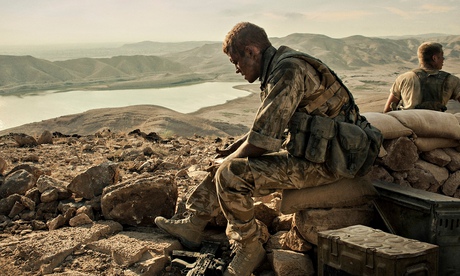
In the 13 years since the war in Afghanistan began, Hollywood has released at least five major feature films about it, including Lions for Lambs, Brothers, Zero Dark Thirty and Lone Survivor. In the same period, the UK has produced just one – the low-budget The Patrol. Next week, we receive No 2: the tough, gruelling Kajaki, a recreation of a lethal real-life 2006 incident in which a group of paratroopers were trapped in a minefield, named after the region in Helmand province where it occurred.
Kajaki is a fascinating, revealing artefact, whether or not you find its actual content – a visceral, empathethic study of the British military – of interest. One of the tiny band of non-second-world-war British war films, it has clearly been financed outside mainstream channels – no TV or BFI money here – and has chosen to go its own way with its distribution, having set up an exclusive deal with the Vue cinema chain and funnelling money back to military charities. It has also swerved clear of openly grappling with the thorny political issues that have surrounded the Afghan war – and its related conflict in Iraq – since its inception.
Kajaki is not a combat film per se: the courage and heroism on display don’t derive from engagement with the Taliban, but rather a gruesome blunder in to a minefield left over from the Soviet invasion. Kajaki’s executive producer Gareth Ellis-Unwin – best known as one of the producers of The King’s Speech – says Kajaki is “politically agnostic”: although one man lost his life, and several more were grievously injured, it’s a story of procedural cockup and red-tape as much as anything else.
Paul Katis, Kajaki’s director, suggests that in this respect the film is truer to “the nature of war”. During his research, he says, he asked about medals: “How many were for a chosen, planned action, and how many for things going wrong?” The “informal” feedback was that “80%-90%” were given in connection with the latter.
Films about the Afghan and Iraq wars will inevitably trigger outraged responses – and not just from Guardian readers. But war films are a staple part of cinema, ranging from extreme, realist statements of radical intent – The Battle of Algiers, Land and Freedom – to fantasies that try to rewrite history – Rambo, Red Dawn. Add in numerous combat documentaries on the one hand, and mythic sci-fi and pseudo-histories – Starship Troopers, Lord of the Rings, Ender’s Game, etc – on the other, and it’s clear we are never far from a war film of one kind or another.
But approaching recent conflicts, where the wounds are fresh and the battlefields still active, is something that the British film industry has proved extremely reluctant to do, especially compared with its US counterparts. Probably the closest Hollywood equivalent to Kajaki is Lone Survivor, in which a four-man Navy Seal team is stranded behind enemy lines. Like Kajaki, it is based on a real incident, though unlike Kajaki it includes copious combat sequences, with much dubious videogame-style footage along the American soldiers’ sightlines.
Kajaki’s makers are anxious to highlight the differences between Hollywood films and theirs. Katis says he was struck by how averse to the trigger-happy antics of onscreen American soldiers the British troops he spoke to were. “That’s just not the British army way. I was told on a number of occasions: we don’t like being called heroes. We’re professional soldiers, just doing our jobs.”
There is a wider issue, of course: the US’s superpower status, as opposed to the UK’s post-imperial hangover. Katis says: “We’ve been apologising since the 1960s for being the big boys. America is the new empire on the block, and they are happy to make films that reinforce it. You would expect them to be bullish about their troops.” But the point remains that Hollywood and the US armed forces are in a mutually supportive relationship that generates a supply of pro-military films that – the blip of Vietnam notwithstanding – has ensured that home support for US troops has rarely wavered.
The situation in the UK is somewhat different. Katis describes a number of contacts with the army and the ministry of defence that can be characterised as “ambiguous” at best; he says they received plenty of help from individual servicemen but the MoD “got cold feet”. In fact, he says that the US department of defense was significantly more responsive, reading the script within 24 hours. “The MoD isn’t set up that way. They are the whipping boy and have a paranoid relationship with the media. I feel sorry for them, as much as you can for a government bureaucracy.”
Be that as it may, Katis remains convinced there is an “institutional bias” in this country against films such as Kajaki, which applies to funding sources as much as Whitehall. However, it turns out to be a case of cut your cloth as you find it.
“We couldn’t afford to do big action pieces, so we replaced action with tension. That’s why the story works. These young men are in this situation, and they have to discover the courage inside themselves. At the heart of it is: what would you do?”
Kajaki is released on 28 November

